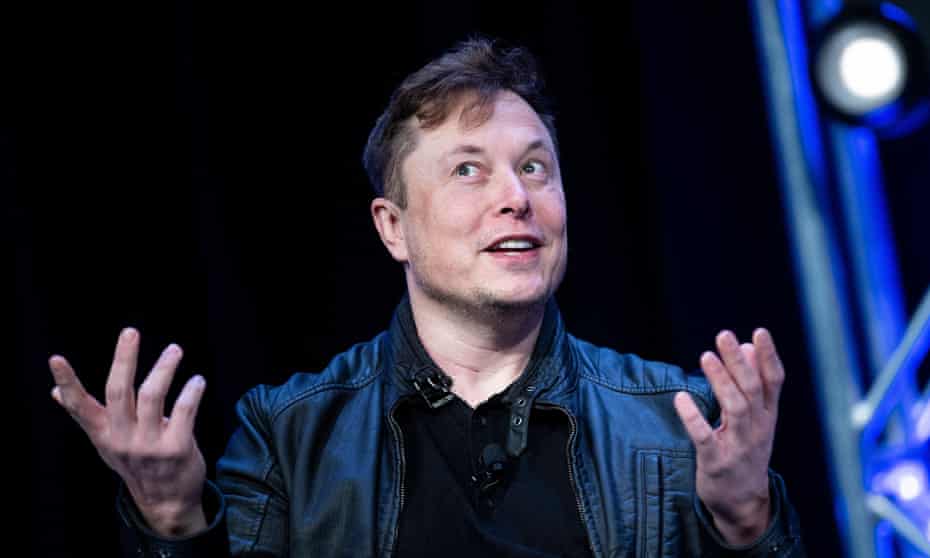US financial watchdog asked Musk 10 days before he announced his takeover bid why he had not disclosed his stake sooner

The US financial watchdog has contacted Elon Musk about the disclosure of his stake in Twitter, asking the Tesla chief executive why he appeared to file a crucial form late.
The Securities and Exchange Commission published a letter sent to the world’s richest man in which it asks a series of questions about how he declared his acquisition of a 9.2% stake on 4 April. The move prompted a flurry of corporate activity that led to Twitter accepting a $44bn (£35bn) takeover bid from Musk on 25 April – although he has since announced that the deal is “on hold” while he seeks more information about the proportion of fake accounts on Twitter.
In the 4 April letter, the SEC asked why a schedule 13G form announcing Musk’s acquisition of a large shareholding “does not appear” to have been filed within the required 10 days of the stake passing the 5% level where it needs to be disclosed publicly. According to Musk’s own filing, he passed the 5% level on 14 March and therefore should have filed the form by 24 March.
“Please advise us why the schedule 13G does not appear to have been made within the required 10 days from the date of acquisition as required by rule 13d-1(c), the rule upon which you represented that you relied to make the submission,” said the SEC in the letter, dated 10 days before Musk announced his takeover bid.
The SEC said that once it had reviewed Musk’s reply it “may have additional comments”. In 2018, Musk reached a settlement with the SEC over a tweet in which he said was considering taking Tesla off the stock market and into private ownership and had “funding secured” for the proposal.
Investors filed a lawsuit against Musk on Wednesday in which they claimed Musk had saved himself $156m by failing to disclose that he had bought more than 5% of Twitter in a timely manner.
The letter also asks Musk to explain why he filed a 13G, which is for passive investors who are not preparing to shake up the business in question. The SEC points out that an investor must file a different form, a 13D, if they have bought the shares with the intention of changing or influencing the control of the company in question. The day after filing his initial form, Musk refiled it as a 13D, for investors who intend to take an active role.
“The difference between a 13D and 13G filing lies mostly in the intent of the purchaser. If the purchaser intends to exert control – loosely defined – then he has to file a D,” said Brian Quinn, an associate professor at Boston College law school. “The 13D is an important signal to the market that the purchaser intends to be active with respect to the company. The 13G signals that the purchaser intends on remaining passive and not exerting control.”
John Coffee, a professor of law at Columbia University, said the letter did not represent the start of a formal investigation, although that may have changed given the date it was sent. “Technically, this would not be called an investigation as there is no indication that it has been referred to the enforcement division (it may have as this letter is dated well over a month and a half ago),” he said. “Is Musk in trouble? He should be. Not only was he late in filing while he was buying more shares, but his various tweets hinted market-moving news and may have manipulated the market,” Coffee added, pointing to a tweet on 20 April when Musk hinted at a tender offer for the business.
In the letter the SEC asked Musk to provide a brief analysis of why he thought he could rely on a clause that allows passive investors to file a 13G instead of a 13D. It asks that the analysis also addresses tweets posted by Musk in which he questions whether Twitter “rigorously adheres” to “free speech principles”, implying that he might want to exert influence over the company.
Meanwhile, Twitter said on Friday it would not accept Egon Durban’s resignation from the board, two days after shareholders blocked his re-election at an annual meeting.
Durban is co-chief executive of private equity firm Silver Lake and is an ally of Musk.
Twitter said Durban failed to receive the support of a majority of the votes in the re-election held earlier this week due to “voting policies of certain institutional investors regarding board service limitations”.
Durban, who serves on the boards of six other companies, has agreed to reduce his board service commitments to no more than five public company boards by 25 May , 2023, Twitter said. The social media company added that Durban was an “effective member” of the board and brought “an unparalleled operational knowledge of the industry”.




